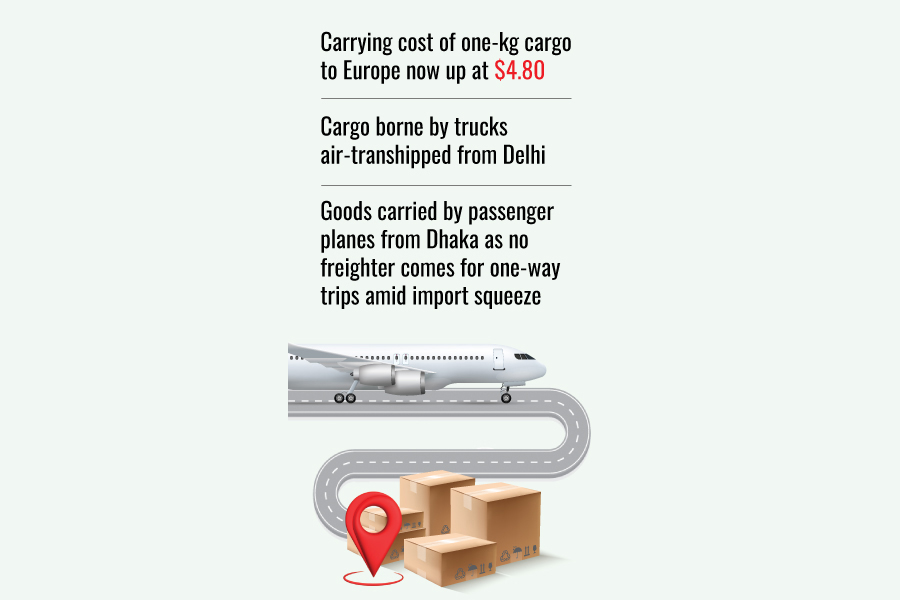Air freight costlier, seaborne trade insecure
Capacity crunch amid demand surge fuels freight costs

Published :
Updated :

Air-freight charge for haulage from Dhaka to European destinations gets costlier amid increased pressure and capacity constraint as seaborne trade remains insecure, officials say.
Exporters bear the brunt of further export-cost rise in March and additional hassles for having to carry cargoes by truck up to New Delhi for air-shipment amid plane-traffic jam in Dhaka, sources said.
Freight-forwarders say airlines flying from Dhaka to various European states are now charging between $4.0 and $4.80 to carry each kilogram of goods-up from US$3.5 in February and $2.0 in January last.
However, the freight rates for flying export goods to the United States, another top destination for Bangladeshi merchandises, remained static in March compared to last few months.
This month, the airlines are charging between $4.20 and $4.50 to transport each kilogram of goods to the United States, they said.
Nasir Ahmed Khan, Director, Bangladesh Freight Forwarders Association (BFFA), told the FE the demand for air-shipment of goods towards the European destinations shot up further in March.
In the meantime, he said, "the carrying capacity of the airlines did not increase so the freight rates went up.
"Cargoes from Dhaka are being carried by passenger planes. No freighter planes come here, thus a capacity shortage always remains," says Mr Khan.
Freighters do not come here because of one-way traffic. "Nowadays, import of goods by air is very limited due to the shortage of foreign currencies," he says about the cause of freighter halt.
Mr Khan explains that freighters are increasingly deployed in neighbouring India and China because of higher freight rates there and readily available cargoes.
Another BFFA official has said in the recent months a good volume of Bangladeshi export cargoes are transhipped through Delhi International Airport which was allowed back in February last year.
According to Sanjiv Edward, CEO for cargo at GMR Airports, some 8,000 tonnes of Bangladeshi cargoes were transhipped to various European destinations during the last one year.
Every day some 20 to 30 goods-laden trucks go to New Delhi to tranship Bangladeshi merchandise.
Shipping-sector officials say the conflicts in the Red Sea area and on the other Middle- Eastern routes like the Gulf of Aden and the Indian Ocean boundaries or the Persian/Arabian Gulf of Oman Sea force ships to travel additional two to three weeks in a detour and so ships fail to reach the destinations in time.
Thus, they say, exporters are forced to make costly air-shipment avoiding lengthy sea route to send goods in time when production gets delayed or there is possibility of delay in transporting goods through seaways.
It has created pressure for air-shipment and so the freight cost has gone up.
Shahidullah Azim, Managing Director, Classic Fashion Concept Ltd, says growing air-shipment cost has created increased pressure on exporters as transporting goods by ship now requires an additional three weeks.
"The major reason of rise in air shipment is war-zone-risk alert on the Red Sea and war in the Middle East which enhanced transit time for ships by an extra 25 days that prompt buyers to ask for sending goods by air," he adds.
In this case, buyers themselves pay the additional costs involved.
"But when manufacturers send goods by air due to their own delay, they pay from their own pocket," says the leading exporter.
Meanwhile, a Bangladeshi ship has been hijacked and commandeered away from the Indian Ocean reportedly by Somali pirates.
syful-islam@outlook.com


 For all latest news, follow The Financial Express Google News channel.
For all latest news, follow The Financial Express Google News channel.